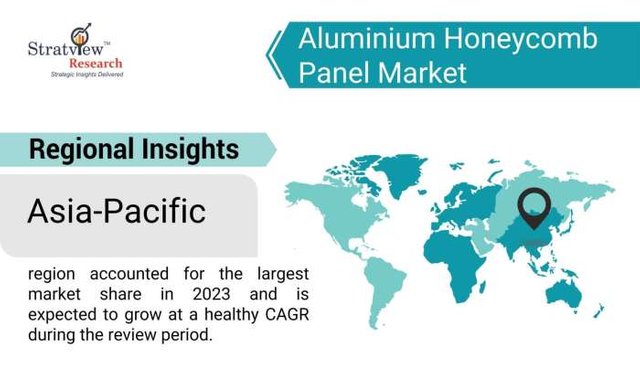Exploring the Growth Potential of the Aluminium Honeycomb Panel Market: Key Trends and Forecast
The aluminium honeycomb panel market is poised for significant growth, driven by its increasing application across diverse industries such as aerospace, construction, automotive, and marine. These panels are valued for their lightweight structure, excellent strength-to-weight ratio, corrosion resistance, and high durability, making them ideal for industries that demand efficiency and long-lasting materials.
According to Stratview Research, the aluminium honeycomb panel market was estimated at USD XX billion in 2023 and is likely to grow at a CAGR of XX% during 2024-2030 to reach USD XX billion in 2030.

Key Growth Drivers
1. Rising Demand in Aerospace and Automotive Industries: Aluminium honeycomb panels are widely used in the aerospace and automotive sectors due to their structural integrity and ability to reduce overall weight, which is crucial for improving fuel efficiency. As governments and industries increasingly prioritize sustainability and fuel economy, the demand for lightweight materials like aluminium honeycomb panels is expected to rise.
2. Growing Adoption in the Construction Industry: The construction industry is leveraging aluminium honeycomb panels for façades, cladding, ceilings, and partitions. Their aesthetic appeal, combined with strength and insulation properties, makes them a preferred choice for modern, sustainable building designs. The trend toward green building practices further boosts their adoption, as these panels contribute to energy efficiency and reduced environmental impact.
3. Marine and Rail Applications: Beyond aerospace and construction, the marine and rail industries are increasingly utilizing aluminium honeycomb panels for interior and structural components due to their durability and corrosion resistance in harsh environments. This broader adoption in multiple sectors is a key factor in the market's growth trajectory.
Market Trends
1. Sustainability and Eco-Friendly Materials: The trend towards eco-friendly construction and transportation materials is fueling the demand for aluminium honeycomb panels, which are recyclable and contribute to overall energy savings in buildings and vehicles. This trend aligns with global efforts to reduce carbon footprints across industries.
2. Technological Advancements: Advances in manufacturing processes are making aluminium honeycomb panels more cost-effective and versatile. Innovations in bonding techniques and surface treatments are enhancing their performance, expanding their applications across industries.
Market Forecast
The global aluminium honeycomb panel market is expected to witness a compound annual growth rate (CAGR) of XX% from 2024 to 2030. This growth will be driven by increasing investments in sustainable infrastructure, transportation, and lightweight materials. Regions like Asia-Pacific, with expanding aerospace and construction sectors, are anticipated to be key contributors to the market's expansion.
Conclusion
The aluminium honeycomb panel market offers substantial growth potential across a wide range of industries. As the demand for lightweight, durable, and eco-friendly materials continues to grow, aluminium honeycomb panels are set to play a critical role in the future of construction, transportation, and more.